Christian’s conversation with one Ignorance
Come, how do you? How stands it between God and your soul now?
IGNORANCE. I hope well; for I am always full of good motions that come into my mind, to comfort me as I walk. I think of God and Heaven.
CHRISTIAN. So do the devils and damned souls.
IGNORANCE. But I think of them, and desire them.
CHRISTIAN. So do many that are never like to come there. “The soul of the sluggard desireth, and hath nothing”.
IGNORANCE. But I think of them, and leave all for them.
CHRISTIAN. That I doubt; for leaving all is a hard matter; yea, a harder matter than many are aware of. But why, or by what, art thou persuaded that thou hast left all for God and Heaven?
IGNORANCE. My heart tells me so.
CHRISTIAN. The wise man says, “He that trusts his own heart is a fool”.
IGNORANCE. This is spoken of an evil heart, but mine is a good one. It comforts me in hopes of Heaven.
CHRISTIAN. That may be through its deceitfulness; for a man’s heart may minister comfort to him in the hopes of that thing, for which he yet has no ground to hope.
IGNORANCE. But my heart and life agree together, and therefore my hope is well grounded.
CHRISTIAN. Who told thee that thy heart and life agree together?
IGNORANCE. My heart tells me so.
CHRISTIAN. Ask my fellow if I be a thief! Thy heart tells thee so! Except the Word of God beareth witness in this matter, other testimony is of no value.
IGNORANCE But is it not a good heart that hath good thoughts? And is not that a good life that is according to God’s commandments?
CHRISTIAN. Yea, that is a good heart that hath good thoughts, and that is a good life that is according to God’s commandments; but it is one thing, indeed, to have these, and another thing only to think so.
IGNORANCE. Pray, what count you good thoughts, and a life according to God’s commandments?
CHRISTIAN. There are good thoughts of divers kinds; some respecting ourselves, some God, some Christ, and some other thing.
IGNORANCE. What be good thoughts respecting ourselves?
CHRISTIAN. Such as agree with the Word of God.
IGNORANCE. When do our thoughts of ourselves agree with the Word of God?
CHRISTIAN. When we pass the same judgment upon ourselves which the Word passes. To explain myself—the Word of God saith of persons in a natural condition, “There is none righteous, there is none that doeth good”. It saith also, that “every imagination of the heart of man is only evil, and that continually”. And again, “The imagination of man’s heart is evil from his youth”. Now then, when we think thus of ourselves, having sense thereof; then are our thoughts good ones, because according to the Word of God.
IGNORANCE. I will never believe that my heart is thus bad.
CHRISTIAN. Therefore thou never hadst one good thought concerning thyself in thy life. But let me go on. As the Word passeth a judgment upon our heart, so it passeth a judgment upon our ways; and when our thoughts of our hearts and ways agree with the judgment which the Word giveth of both, then are both good, because agreeing thereto. Why, the Word of God saith that man’s ways are crooked ways; not good, but perverse. It saith they are naturally out of the good way, that they have not known it. Now, when a man thus thinketh of his ways; I say, when he doth sensibly, and with heart humiliation, thus think, then hath he good thoughts of his own ways, because his thoughts now agree with the judgment of the Word of God.
IGNORANCE. What are good thoughts concerning God?
CHRISTIAN. Even as I have said concerning ourselves, when our thoughts of God do agree with what the Word saith of Him; and that is, when we think of His being and attributes as the Word hath taught, of which I cannot now discourse at large; but to speak of Him with reference to us: Then we have right thoughts of God, when we think that He knows us better than we know ourselves, and He can see sin in us when and where we can see none in ourselves; when we think He knows our inmost thoughts, and that our heart, with all its depths, is always open unto His eyes; also, when we think that all our righteousness stinks in His nostrils, and that, therefore, He cannot abide to see us stand before Him in any confidence, even in all our best performances.
IGNORANCE. Do you think that I am such a fool as to think God can see no further than I? Or, that I would come to God in the best of my performances? Why, to be short, I think I must believe in Christ for justification.
CHRISTIAN. How! think thou must believe in Christ, when thou seest not thy need of Him! Thou neither seest thy original nor actual infirmities; but hast such an opinion of thyself, and of what thou dost, as plainly renders thee to be one that did never see a necessity of Christ’s personal righteousness to justify thee before God. How, then, dost thou say, I believe in Christ?
IGNORANCE. I believe that Christ died for sinners; and that I shall be justified before God from the curse, through His gracious acceptance of my obedience to His law. Or thus, Christ makes my duties, that are religious, acceptable to His Father, by virtue of His merits; and so shall I be justified.
CHRISTIAN. Let me give an answer to this confession of thy faith. 1. Thou believest with a fantastical faith; for this faith is nowhere described in the Word. 2. Thou believest with a false faith; because it taketh justification from the personal righteousness of Christ, and applies it to thy own. 3. This faith maketh not Christ a justifier of thy person, but of thy actions; and of thy person for thy actions’ sake, which is false. 4. Therefore, this faith is deceitful, even such as will leave thee under wrath, in the day of God Almighty; for true justifying faith puts the soul, as sensible of its lost condition by the law, upon flying for refuge unto Christ’s righteousness, which righteousness of His is not an act of grace, by which He maketh, for justification, thy obedience accepted with God; but His personal obedience to the law, in doing and suffering for us what that required at our hands; this righteousness, I say, true faith accepteth; under the skirt of which, the soul being shrouded, and by it presented as spotless before God, it is accepted, and acquit from condemnation.
IGNORANCE. What! would you have us trust to what Christ, in His own person, has done without us? This conceit would loosen the reins of our lust, and tolerate us to live as we list; for what matter how we live, if we may be justified by Christ’s personal righteousness from all, when we believe it?
CHRISTIAN. Ignorance is thy name, and as thy name is, so art thou; even this thy answer demonstrateth what I say. Ignorant thou art of what justifying righteousness is, and as ignorant how to secure thy soul, through the faith of it, from the heavy wrath of God. Yea, thou also art ignorant of the true effects of saving faith in this righteousness of Christ, which is, to bow and win over the heart to God in Christ, to love His name, His Word, ways, and people, and not as thou ignorantly imaginest.
HOPEFUL, Christian’s companion speaks , Ask him if ever he had Christ revealed to him from Heaven.
IGNORANCE. What! You are a man for revelations! I believe that what both you, and all the rest of you, say about that matter, is but the fruit of distracted brains.
HOPEFUL. Why, man! Christ is so hid in God from the natural apprehensions of the flesh that He cannot by any man be savingly known, unless God the Father reveals Him to them.
IGNORANCE. That is your faith, but not mine; yet mine, I doubt not, is as good as yours, though I have not in my head so many whimsies as you.
CHRISTIAN. Give me leave to put in a word. You ought not so slightly to speak of this matter; for this I will boldly affirm, even as my good companion hath done, that no man can know Jesus Christ but by the revelation of the Father; yea, and faith too, by which the soul layeth hold upon Christ, if it be right, must be wrought by the exceeding greatness of His mighty power; the working of which faith, I perceive, poor Ignorance, thou art ignorant of. Be awakened then, see thine own wretchedness, and fly to the Lord Jesus; and by His righteousness, which is the righteousness of God, for He Himself is God, thou shalt be delivered from condemnation. Then they said—
Well, Ignorance, wilt thou yet foolish be To slight good counsel, ten times given thee? And if thou yet refuse it, thou shalt know, Ere long, the evil of thy doing so. Remember, man, in time, stoop, do not fear; Good counsel taken well, saves: therefore hear. But if thou yet shalt slight it, thou wilt be The loser (Ignorance) I’ll warrant thee.
Epilogue
Now while I was gazing upon all these things, I turned my head to look back, and saw Ignorance come up to the river side; but he soon got over, and that without half that difficulty which the other two men met with. For it happened that there was then in that place, one Vain-hope, a ferryman, that with his boat helped him over; so he, as the other I saw, did ascend the hill, to come up to the gate, only he came alone; neither did any man meet him with the least encouragement. When he was come up to the gate, he looked up to the writing that was above, and then began to knock, supposing that entrance should have been quickly administered to him; but he was asked by the men that looked over the top of the gate, Whence came you? and what would you have? He answered, I have eat and drank in the presence of the King, and He has taught in our streets. Then they asked him for his certificate, that they might go in and show it to the King; so he fumbled in his bosom for one, and found none. Then said they, Have you none? But the man answered never a word. So they told the King, but He would not come down to see him, but commanded the two Shining Ones that conducted Christian and Hopeful to the City, to go out and take Ignorance, and bind him hand and foot, and have him away. Then they took him up, and carried him through the air, to the door that I saw in the side of the hill, and put him in there. Then I saw that there was a way to hell, even from the gates of Heaven, as well as from the City of Destruction!
So I awoke, and behold it was a dream
Christian’s conversation with one Ignorance
Come, how do you? How stands it between God and your soul now?
IGNORANCE. I hope well; for I am always full of good motions that come into my mind, to comfort me as I walk. I think of God and Heaven.
CHRISTIAN. So do the devils and damned souls.
IGNORANCE. But I think of them, and desire them.
CHRISTIAN. So do many that are never like to come there. “The soul of the sluggard desireth, and hath nothing”.
IGNORANCE. But I think of them, and leave all for them.
CHRISTIAN. That I doubt; for leaving all is a hard matter; yea, a harder matter than many are aware of. But why, or by what, art thou persuaded that thou hast left all for God and Heaven?
IGNORANCE. My heart tells me so.
CHRISTIAN. The wise man says, “He that trusts his own heart is a fool”.
IGNORANCE. This is spoken of an evil heart, but mine is a good one. It comforts me in hopes of Heaven.
CHRISTIAN. That may be through its deceitfulness; for a man’s heart may minister comfort to him in the hopes of that thing, for which he yet has no ground to hope.
IGNORANCE. But my heart and life agree together, and therefore my hope is well grounded.
CHRISTIAN. Who told thee that thy heart and life agree together?
IGNORANCE. My heart tells me so.
CHRISTIAN. Ask my fellow if I be a thief! Thy heart tells thee so! Except the Word of God beareth witness in this matter, other testimony is of no value.
IGNORANCE But is it not a good heart that hath good thoughts? And is not that a good life that is according to God’s commandments?
CHRISTIAN. Yea, that is a good heart that hath good thoughts, and that is a good life that is according to God’s commandments; but it is one thing, indeed, to have these, and another thing only to think so.
IGNORANCE. Pray, what count you good thoughts, and a life according to God’s commandments?
CHRISTIAN. There are good thoughts of divers kinds; some respecting ourselves, some God, some Christ, and some other thing.
IGNORANCE. What be good thoughts respecting ourselves?
CHRISTIAN. Such as agree with the Word of God.
IGNORANCE. When do our thoughts of ourselves agree with the Word of God?
CHRISTIAN. When we pass the same judgment upon ourselves which the Word passes. To explain myself—the Word of God saith of persons in a natural condition, “There is none righteous, there is none that doeth good”. It saith also, that “every imagination of the heart of man is only evil, and that continually”. And again, “The imagination of man’s heart is evil from his youth”. Now then, when we think thus of ourselves, having sense thereof; then are our thoughts good ones, because according to the Word of God.
IGNORANCE. I will never believe that my heart is thus bad.
CHRISTIAN. Therefore thou never hadst one good thought concerning thyself in thy life. But let me go on. As the Word passeth a judgment upon our heart, so it passeth a judgment upon our ways; and when our thoughts of our hearts and ways agree with the judgment which the Word giveth of both, then are both good, because agreeing thereto. Why, the Word of God saith that man’s ways are crooked ways; not good, but perverse. It saith they are naturally out of the good way, that they have not known it. Now, when a man thus thinketh of his ways; I say, when he doth sensibly, and with heart humiliation, thus think, then hath he good thoughts of his own ways, because his thoughts now agree with the judgment of the Word of God.
IGNORANCE. What are good thoughts concerning God?
CHRISTIAN. Even as I have said concerning ourselves, when our thoughts of God do agree with what the Word saith of Him; and that is, when we think of His being and attributes as the Word hath taught, of which I cannot now discourse at large; but to speak of Him with reference to us: Then we have right thoughts of God, when we think that He knows us better than we know ourselves, and He can see sin in us when and where we can see none in ourselves; when we think He knows our inmost thoughts, and that our heart, with all its depths, is always open unto His eyes; also, when we think that all our righteousness stinks in His nostrils, and that, therefore, He cannot abide to see us stand before Him in any confidence, even in all our best performances.
IGNORANCE. Do you think that I am such a fool as to think God can see no further than I? Or, that I would come to God in the best of my performances? Why, to be short, I think I must believe in Christ for justification.
CHRISTIAN. How! think thou must believe in Christ, when thou seest not thy need of Him! Thou neither seest thy original nor actual infirmities; but hast such an opinion of thyself, and of what thou dost, as plainly renders thee to be one that did never see a necessity of Christ’s personal righteousness to justify thee before God. How, then, dost thou say, I believe in Christ?
IGNORANCE. I believe that Christ died for sinners; and that I shall be justified before God from the curse, through His gracious acceptance of my obedience to His law. Or thus, Christ makes my duties, that are religious, acceptable to His Father, by virtue of His merits; and so shall I be justified.
CHRISTIAN. Let me give an answer to this confession of thy faith. 1. Thou believest with a fantastical faith; for this faith is nowhere described in the Word. 2. Thou believest with a false faith; because it taketh justification from the personal righteousness of Christ, and applies it to thy own. 3. This faith maketh not Christ a justifier of thy person, but of thy actions; and of thy person for thy actions’ sake, which is false. 4. Therefore, this faith is deceitful, even such as will leave thee under wrath, in the day of God Almighty; for true justifying faith puts the soul, as sensible of its lost condition by the law, upon flying for refuge unto Christ’s righteousness, which righteousness of His is not an act of grace, by which He maketh, for justification, thy obedience accepted with God; but His personal obedience to the law, in doing and suffering for us what that required at our hands; this righteousness, I say, true faith accepteth; under the skirt of which, the soul being shrouded, and by it presented as spotless before God, it is accepted, and acquit from condemnation.
IGNORANCE. What! would you have us trust to what Christ, in His own person, has done without us? This conceit would loosen the reins of our lust, and tolerate us to live as we list; for what matter how we live, if we may be justified by Christ’s personal righteousness from all, when we believe it?
CHRISTIAN. Ignorance is thy name, and as thy name is, so art thou; even this thy answer demonstrateth what I say. Ignorant thou art of what justifying righteousness is, and as ignorant how to secure thy soul, through the faith of it, from the heavy wrath of God. Yea, thou also art ignorant of the true effects of saving faith in this righteousness of Christ, which is, to bow and win over the heart to God in Christ, to love His name, His Word, ways, and people, and not as thou ignorantly imaginest.
HOPEFUL, Christian’s companion speaks , Ask him if ever he had Christ revealed to him from Heaven.
IGNORANCE. What! You are a man for revelations! I believe that what both you, and all the rest of you, say about that matter, is but the fruit of distracted brains.
HOPEFUL. Why, man! Christ is so hid in God from the natural apprehensions of the flesh that He cannot by any man be savingly known, unless God the Father reveals Him to them.
IGNORANCE. That is your faith, but not mine; yet mine, I doubt not, is as good as yours, though I have not in my head so many whimsies as you.
CHRISTIAN. Give me leave to put in a word. You ought not so slightly to speak of this matter; for this I will boldly affirm, even as my good companion hath done, that no man can know Jesus Christ but by the revelation of the Father; yea, and faith too, by which the soul layeth hold upon Christ, if it be right, must be wrought by the exceeding greatness of His mighty power; the working of which faith, I perceive, poor Ignorance, thou art ignorant of. Be awakened then, see thine own wretchedness, and fly to the Lord Jesus; and by His righteousness, which is the righteousness of God, for He Himself is God, thou shalt be delivered from condemnation. Then they said—
Well, Ignorance, wilt thou yet foolish be To slight good counsel, ten times given thee? And if thou yet refuse it, thou shalt know, Ere long, the evil of thy doing so. Remember, man, in time, stoop, do not fear; Good counsel taken well, saves: therefore hear. But if thou yet shalt slight it, thou wilt be The loser (Ignorance) I’ll warrant thee.
Epilogue
Now while I was gazing upon all these things, I turned my head to look back, and saw Ignorance come up to the river side; but he soon got over, and that without half that difficulty which the other two men met with. For it happened that there was then in that place, one Vain-hope, a ferryman, that with his boat helped him over; so he, as the other I saw, did ascend the hill, to come up to the gate, only he came alone; neither did any man meet him with the least encouragement. When he was come up to the gate, he looked up to the writing that was above, and then began to knock, supposing that entrance should have been quickly administered to him; but he was asked by the men that looked over the top of the gate, Whence came you? and what would you have? He answered, I have eat and drank in the presence of the King, and He has taught in our streets. Then they asked him for his certificate, that they might go in and show it to the King; so he fumbled in his bosom for one, and found none. Then said they, Have you none? But the man answered never a word. So they told the King, but He would not come down to see him, but commanded the two Shining Ones that conducted Christian and Hopeful to the City, to go out and take Ignorance, and bind him hand and foot, and have him away. Then they took him up, and carried him through the air, to the door that I saw in the side of the hill, and put him in there. Then I saw that there was a way to hell, even from the gates of Heaven, as well as from the City of Destruction!
So I awoke, and behold it was a dream

















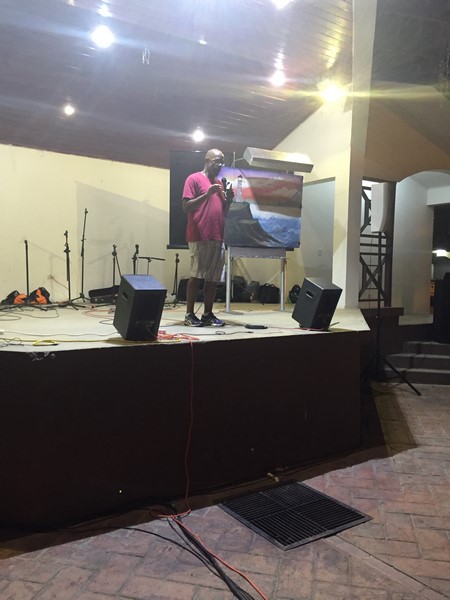





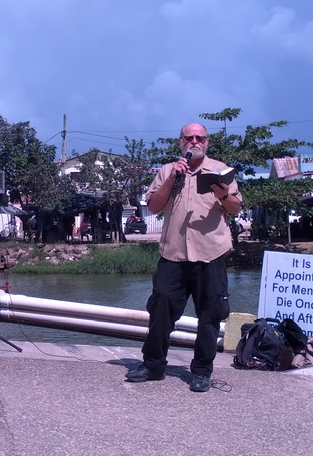



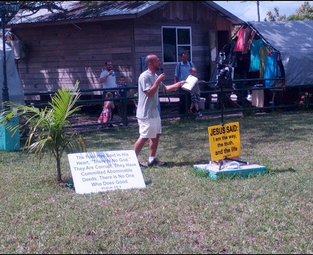
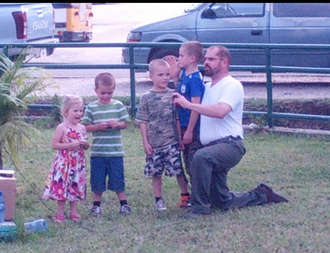




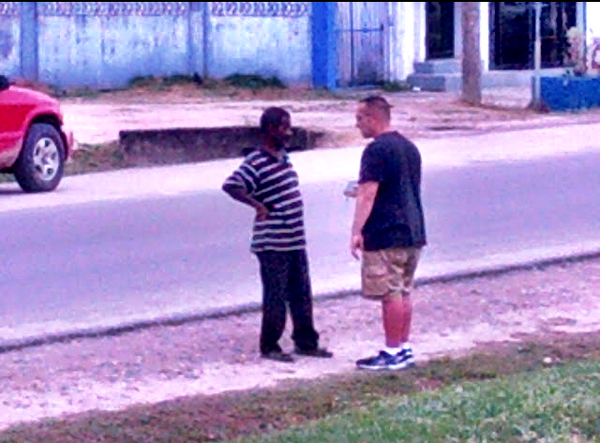
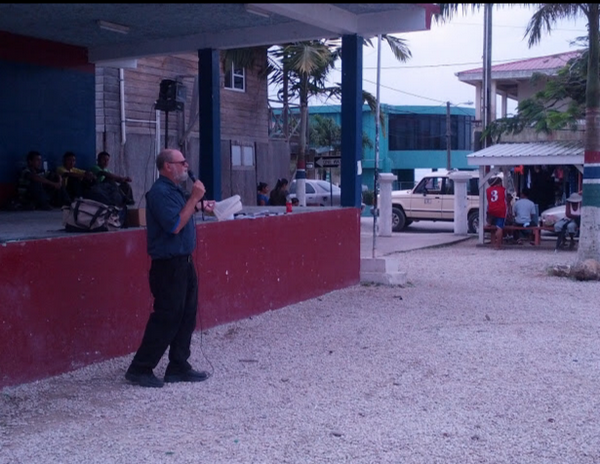
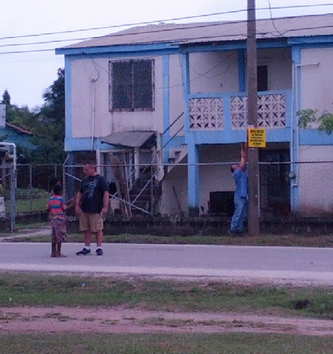


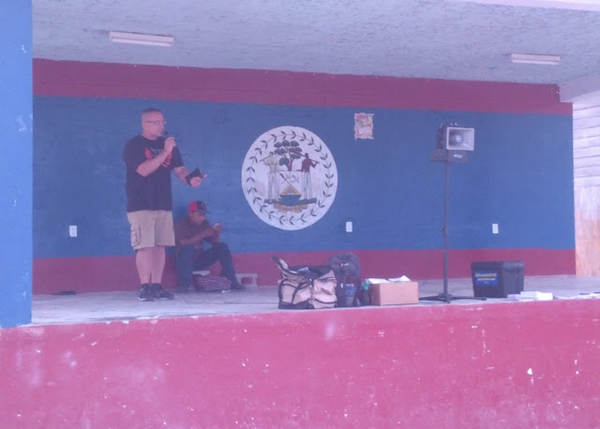























 This year we were invited to Belize by our friend in co-laborer for the Gospel, Nate Steur. Nate and his wife and family moved there 8 months ago, believing that God had arranged things in their life in such a way that they could be used in a new place in serving the Lord. After Nate and his wife had visited Belize they both felt this was where God was willing that they serve Him, in a foreign land, with a great need for sharing the Gospel in the markets where the people are and to help in a local church in whatever their needs are. Belize, contrary to what many believe, is not an island nor one of the small countries near Russia. It is a small Central American country South of Mexico and next to Guatemala. It has a very diverse ethnic population. Mayans, Garifuna, Ketchi, Hispanic, Mennonites, and an increasing number of retired or disgruntled Americans. Many can speak enough English to buy and sell, but they read in their own language. Nate has been tremendously blessed by various ministries like Wycliff and Chapel Library, in printing and shipping religious literature in their native tongue. With their help, and with the help of others who want to see the Gospel advanced, who help pay the shipping costs, Nate can provide Bibles or gospel of John in their own language. Mike Stockwell and Robert Gray of “ Cross Country Evangelism” and myself flew into Belize City, and Nate drove us to his home in Punta Gorda, 5 hours away. We were privileged during our 12 days there to preach the Gospel in Punta Gorda, Independence, Dangriga, Belmopan, St. Ignacio, and Belize City. Many people listened, and a large amount of Christian literature was distributed. There were countless conversations. The people there are very open. I was asked to pray with and for numerous men, for healing, for strength, for family men. Of course the first thing is always to talk much of Jesus and pray that God in His mercy would grant them repentance toward God and faith in Jesus Christ. The people of Belize are religious, believing in God, fearing God and many have a respect for God’s Word being preached. Never once did we hear someone from Belize grumble or complain about sharing the Gospel although we did hear from some Americans who would have had us silenced if they could. There are some good Christian churches and we attended one near Punta Gorda and one near Dangriga. Many, Many do not attend a good church and hence live their life in sin, not even aware that Jesus came into the world to save sinners. There is much religion on display; word of faith tent meetings, Roman Catholicism, Mennonites, and mostly a mix of man-centered organizations professing to be Christian. Accordingly there is much sexual immorality, idolatry, and drunkenness. So we preach Jesus Christ and Him crucified. We preach the Gospel in faith knowing it is – the power of God unto salvation to those who are saved. And unlike many Americans, the people of Belize don’t necessarily think it is foolishness, they just have a lack of knowledge in the sinfulness of sin and the holiness of God, and the judgment to come. How will they call on Him in whom they have not believed? And how shall they believe in Him of whom they have not heard? And how shall they hear without a preacher? And how shall they preach, except they be sent? To be sure, the people there are sinners deserving of the wrath of God. And God would speak through a man named Paul saying, “Such were some of you”. We were blessed and privileged to preach the Gospel there. We have now returned to the U.S. Nate and his family remain, being spent there for Christ’s sake. Please join me in prayer that God will use our labors in Belize for His glory and draw many there to His Son. May the knowledge of the truth bring many to a godly sorrow for their sin leading to repentance. And may the Holy Spirit continue working there, protecting the seeds that were planted, softening hearts, and bringing about true conversions. If you would like to hear more of Nate Steur’s missionary work, or if you would like in shipping Christian material there, his face book is :
This year we were invited to Belize by our friend in co-laborer for the Gospel, Nate Steur. Nate and his wife and family moved there 8 months ago, believing that God had arranged things in their life in such a way that they could be used in a new place in serving the Lord. After Nate and his wife had visited Belize they both felt this was where God was willing that they serve Him, in a foreign land, with a great need for sharing the Gospel in the markets where the people are and to help in a local church in whatever their needs are. Belize, contrary to what many believe, is not an island nor one of the small countries near Russia. It is a small Central American country South of Mexico and next to Guatemala. It has a very diverse ethnic population. Mayans, Garifuna, Ketchi, Hispanic, Mennonites, and an increasing number of retired or disgruntled Americans. Many can speak enough English to buy and sell, but they read in their own language. Nate has been tremendously blessed by various ministries like Wycliff and Chapel Library, in printing and shipping religious literature in their native tongue. With their help, and with the help of others who want to see the Gospel advanced, who help pay the shipping costs, Nate can provide Bibles or gospel of John in their own language. Mike Stockwell and Robert Gray of “ Cross Country Evangelism” and myself flew into Belize City, and Nate drove us to his home in Punta Gorda, 5 hours away. We were privileged during our 12 days there to preach the Gospel in Punta Gorda, Independence, Dangriga, Belmopan, St. Ignacio, and Belize City. Many people listened, and a large amount of Christian literature was distributed. There were countless conversations. The people there are very open. I was asked to pray with and for numerous men, for healing, for strength, for family men. Of course the first thing is always to talk much of Jesus and pray that God in His mercy would grant them repentance toward God and faith in Jesus Christ. The people of Belize are religious, believing in God, fearing God and many have a respect for God’s Word being preached. Never once did we hear someone from Belize grumble or complain about sharing the Gospel although we did hear from some Americans who would have had us silenced if they could. There are some good Christian churches and we attended one near Punta Gorda and one near Dangriga. Many, Many do not attend a good church and hence live their life in sin, not even aware that Jesus came into the world to save sinners. There is much religion on display; word of faith tent meetings, Roman Catholicism, Mennonites, and mostly a mix of man-centered organizations professing to be Christian. Accordingly there is much sexual immorality, idolatry, and drunkenness. So we preach Jesus Christ and Him crucified. We preach the Gospel in faith knowing it is – the power of God unto salvation to those who are saved. And unlike many Americans, the people of Belize don’t necessarily think it is foolishness, they just have a lack of knowledge in the sinfulness of sin and the holiness of God, and the judgment to come. How will they call on Him in whom they have not believed? And how shall they believe in Him of whom they have not heard? And how shall they hear without a preacher? And how shall they preach, except they be sent? To be sure, the people there are sinners deserving of the wrath of God. And God would speak through a man named Paul saying, “Such were some of you”. We were blessed and privileged to preach the Gospel there. We have now returned to the U.S. Nate and his family remain, being spent there for Christ’s sake. Please join me in prayer that God will use our labors in Belize for His glory and draw many there to His Son. May the knowledge of the truth bring many to a godly sorrow for their sin leading to repentance. And may the Holy Spirit continue working there, protecting the seeds that were planted, softening hearts, and bringing about true conversions. If you would like to hear more of Nate Steur’s missionary work, or if you would like in shipping Christian material there, his face book is :



